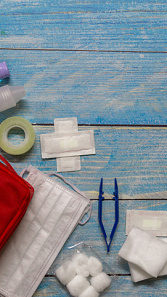Understanding the connection between diet and sport is essential for achieving optimal well-being. Many individuals overlook the importance of nutrition in supporting physical activity and overall health. Our new cover star, nutritionist Maren Tschinkel, emphasizes the significance of balanced meals and the right nutrients, explaining how they can enhance energy levels and resilience. She shares practical tips on making healthier food choices and how small changes can lead to a more fulfilling lifestyle.
.jpg)
How closely tied is regular physical activity to a healthy diet, and can one truly thrive without the other?
They absolutely walk align. Your diet can be compared to the raw material/ building blocks of building a house. They must be good quality in order for the house to last and maintain. It’s just the same with the food we put into our body. These are the nutritions our body is build from.
Having the right diet will automatically improve your health and make you feel more energetic for regular physical activity. We are supposed to move our body daily and exercise regularly to maintain our health.
However, without the right diet, physical activity alone can improve your overall health, but it becomes much more effective when combined with proper nutrition.
.jpeg)
How can nutrition impact mental health and overall mood? Are there specific foods that are boost emotional well-being?
Having lack of nutritions and vitamins could lead to depression or anxiety. While taking care of getting enough vitamins especially vitamin B6, which helps synthesize feel-good neurotransmitters like dopamine and serotonin will help to improve your mood.
There are many other vitamins on the list that will improve your mood, another example is vitamin D which increases the capacity of developing neurons to release dopamine.
A lack of essential nutrients causes physical as well as mental health problems.
.jpeg)
We often hear about stress eating, but how can the right diet actually help reduce stress and improve resilience to daily pressures?
When our body experiences stress, our blood sugar levels automatically go higher. In the same time the hormone cortisol is released which makes us insulin resistance. This means our cells can’t take up on sugar as easily as usually. That’s why it is very important to eat low sugar foods during stressful periods. Try to help your body to get the blood sugar levels lower and stay away from refined sugar and carbs. Coffee and energy drinks should be avoided as it would increase the cortisol levels even further.

What are some easy ways for people on a tight budget to start eating healthy? How can they make the most of affordable ingredients?
Eating organically doesn’t always need to cost you that much more. If you compare products in the supermarket, the organic foods are often just a couple dollars more expensive. On the long term, this will pay off because medical bills will cost you a lot more later on. It is proven in several studies that those chemicals on non-organic food and highly processed fast food can lead to diseases and harm our health on the long run.
My advice would be: It is an investment in your health and longevity journey to buy healthy and organic foods.
.jpeg)
If you had to build a «starter pack» of essential foods for someone who wants to transition to a healthier lifestyle, what would it include and why?
Fruits/vegetables: these should be the majority of your diet. Tasty and full of great nutrients. Fruits and vegetables fall under the category of carbs, which a lot of people forget about.
Proteins: any kind of natural protein is great for your body. So-called complete proteins must contain all 9 essential amino acids. These are mostly found in animal proteins, but soy products like tofu and edamame also provide all essential amino acids. It is important to get all 9 amino acids, as the body can’t make it by itself.
Healthy carbs: whole grains/rice/quinoa — these are great sources of fiber and have proven to make you feel the most satisfied and full.
Healthy oils: quality over quantity. In today’s society, we often overconsume oils. Especially, I would recommend staying away from the common vegetable oils. Instead, use high quality olive oil or flaxseed oil. Our body needs oils to absorb fat-soluble vitamins such as A, D, E and K.

With the rise of fast-paced lifestyles, what are your go-to recommendations for quick, healthy meals that don’t require hours of preparation?
As a snack, fresh cut vegetables or fruits are great in between and on the go. Take away salads or fresh salad bars are always a quick but healthy choice.
What do you think are the most common mistakes people make when trying to combine nutrition and exercise for better health?
- Over consuming synthetic protein shakes with artificial sweeteners, which are definitely not healthy.
- Overconsumption of energy drinks before and during the workout.
- Not listening to your body’s resting time.
.jpeg)
When people engage in different types of physical activity — like cardio strength, or yoga — should their diet change to support each specific type of exercise?
For endurance athletes, high carbohydrate intake, up to 70% of the daily calories, is recommended. It helps support the high volume of glucose needed for physical activity.
Also, for a non-athlete, before doing cardio, eating more carbohydrates will support the exercise that day. While for yoga, eating foods rich in proteins and vitamins is recommended. In general, as a sports athlete, fresh, varied, and unprocessed foods are the best choice.

What’s the most valuable lesson you’ve learned through your work?
There is no such thing as one diet fits it all. There might be some diets that suit to many people, but everyone is individual. The same as there is not one shoe that fits everyone. Studies has proven that majority of the population is wearing shoe size 7. But imagine if we would only produce size 7 from now on. Everyone that isn’t fitting into a size 7 would have problems. The same situation can be applied on diets. Even if there are certain forms that might fit the majority, there will always be people who don’t fit into that diet. Everyone is different and everyone needs to adjust to their own individual needs.
Listening to your own individual body’s needs should always be your most trusted source.

What are some of the most common questions or misconceptions you encounter from your audience about health and wellness?
Does counting calories work? The answer is yes and no. Not every calorie can count the same as the other. For example, 50 calories of an apple won’t count the same as 50 calories of a chocolate bar. While on the other hand, overconsumption of calories can likely lead to weight gain and therefore keeping track of the total amount could be helpful.
What do you find most fulfilling about helping others achieve a healthier lifestyle, and how has that impacted your personal approach to health?
Giving and helping others makes us happier than receiving. It really fulfills me if I can help others to achieve a healthier lifestyle and improve their longevity. It brings joy and happiness to everyone and makes the world a better place.

















